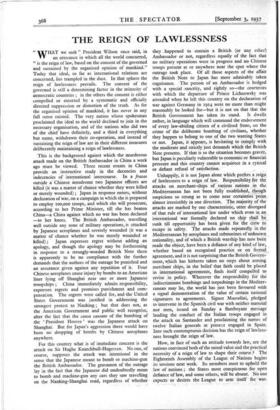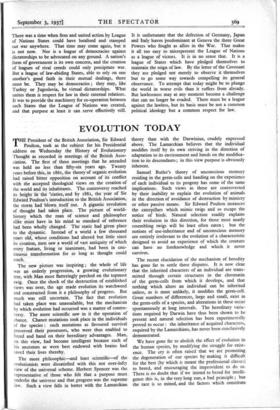THE REIGN OF LAWLESSNESS
WHAT we seek " President Wilson once said, in an utterance in which all the world concurred, " is the reign of law, based on the consent of the governed and sustained by the organised opinion of mankind." Today that ideal, so far as international relations are concerned, lies trampled in the dust. In that sphere the reign of lawlessness prevails. The consent of the governed is still a determining factor in the minority of aemocratic countries ; in the others the consent is either compelled or extorted by a systematic and officially directed suppression or distortion of the truth. As for the organised opinion of mankind, it has never in any full sense existed. The very nation whose spokesman proclaimed the ideal to the world declined to join in the necessary organisation, and of the nations who did two of the chief have definitely, and a third in everything but name, withdrawn their co-operation, and instead of sustaining the reign of law are in their different measures deliberately maintaining a reign of lawlessness.
This is the background against which the murderous attack made on the British Ambassador in China a week ago must be viewed. Three recent events in China provide an instructive study in the decencies and indecencies of international intercourse. In a fracas ane outside a Chinese aerodrome two Japse officers are killed (it was a matter of chance whether they were killed or merely wounded) ; Japan in response enters, without declaration of war, on a campaign in which she is prepared to employ ioo,000 troops, and which she will prosecute, according to her Prime Minister, till she has beaten China—a China against which no war has been declared —to her knees. The British Ambassador, travelling well outside any zone of military operations, is attacked by Japanese aeroplanes and severely wounded (it was a matter of chance whether he was merely wounded or killed) ; Japan expresses regret without adding an apology, and though the apology may be forthcoming in response to a strongly-worded British Note there is apparently to be no compliance with the further demands that the authors of the outrage be punished and an assurance given against any repetition of it. Four Chinese aeroplanes cause injury by bombs to an American liner lying off Shanghai near one or more Japanese troopships ; China immediately admits responsibility, expresses regrets and promises punishment and com- pensation. The regrets were called for, and the United States Government was justified in addressing the strongest protest to Nanking ; but that does not, as the American Government and public well recognise, alter the fact that the causa causans of the bombing of the ' President Hoover ' was the Japanese attack on Shanghai. But for Japan's aggression there would have been no dropping of bombs by Chinese aeroplanes anywhere.
For this country what is of inaniediate concern is the attack on Sir Hughe Knatchbull-Hugessen. No one, of course, supposes the attack was intentional in the sense that the Japanese meant to bomb or machine-gun the British Ambassador. The gravamen of the outrage lay in the fact that the Japanese did undoubtedly mean to bomb and machine-gun any cars they saw travelling on the Nanking-Shanghai road, regardless of whether they _happened to contain a British (or any other) Ambassador or not, regardless equally of the fact that no military operations were in progress and no Chinese troops present at or anywhere near the spot where the outrage took place. Of all those aspects of the affair the British Note to Japan has most admirably taken cognisance. The person of an Ambassador is hedged with a special sanctity, and rightly so—the courtesies with which the departure of Prince Lichnowsky was attended when he left this country on the declaration of war against Germany in 1914 were no more than might reasonably be looked for—but it is not on that that the British Government has taken its stand. It dwells rather, in language which will command the endorsement of every law-abiding citizen of a civilised State, on the crime of the deliberate bombing of civilians, whether they happen to belong to one of the two warring States or not. Japan, it appears, is hesitating to comply with the moderate and strictly just demands which the British Note presents. If that is so the situation becomes graver, but Japan is peculiarly vulnerable to economic or financial pressure and this country cannot acquiesce in a cynical or defiant refusal of satisfaction.
Unhappily, it is not Japan alone which prefers a reign of lawlessness to a reign of law. Responsibility for the attacks on merchant-ships of various nations in the Mediterranean has not been fully established, though suspicions so strong as to come near certainties point, almost irresistibly in one direction. The majority of the attacks are marked by one characteristic, utter disregard of that rule of international law under which even in an international war formally declared no ship shall be sunk till opportunity has been given for the crew to escape in safety. The attacks made repeatedly in the Mediterranean by aeroplanes and submarines of unknown nationality, and of which a British warship has now been made the object, have been a defiance of any kind of law, whether based on recognised practice or on formal agreement, and it is not surprising that the British Govern- ment, which has hitherto taken no steps about arming merchant ships, in the belief that faith could be placed in international agreements, finds itself compelled to revise its policy. Wherever the responsibility for the indiscriminate bombings and torpedoings in the Mediter- ranean may lie, the world has just been favoured with a signal demonstration of the value of certain national signatures to agreements. Signor Mussolini, pledged to intervene in the Spanish civil war with neither material nor men, issued on Sunday a flamboyant message lauding the conduct of the Italian troops engaged in the attack on Santander and proclaiming the names of twelve Italian generals at preseilt engaged in Spain. Into such contemptuous derision has the reign of lawless- ness brought the reign of law.
How, in face of such an attitude towards law, are the nations convinced both of the moral value and the practical necessity of a reign of law to shape their course ? The Eighteenth Assembly of the League of Nations begins its sessions next week. Its members meet to uphold the law of nations ; the States most conspicuous for open defiance 'of law, and some others, will be absent. No one expects or desires the League to arm itself for war. There was a time when firm and united action by League of Nations States could have localised and stamped out war anywhere. That time may come again, but it is not now. Nor is a league of democracies against dictatorships to be advocated on any ground. A nation's form of government is its own concern, and the creation of leagues of rival creeds could only precipitate war. But a league of law-abiding States, able to rely on one another's good faith in their mutual dealings, there must be. They may be democracies ; they may, like Turkey or Jugoslovia, be virtual dictatorships. What unites them is respect for law in their external relations. It was to provide the machinery for co-operation between such States that the League of Nations was created, and that purpose at least it can serve effectively still. It is unfortunate that the defection of Germany, Japan and Italy leaves predominant at Geneva the three Great Powers who fought as allies in the War. That makes it all too easy to misrepresent the League of Nations as a league of victors. It is in no sense that. It is a league of States which have pledged themselves to maintain the reign of law. By the letter of the Covenant they are pledged not merely to observe it themselves but to go some way towards compelling its general observance. To attempt that today might be to plunge the world in worse evils than it suffers from already. But lawlessness may at any moment become a challenge that can no longer be evaded. There must be a league against the lawless, but its basis must be not a common political ideology but a common respect for law.











































 Previous page
Previous page